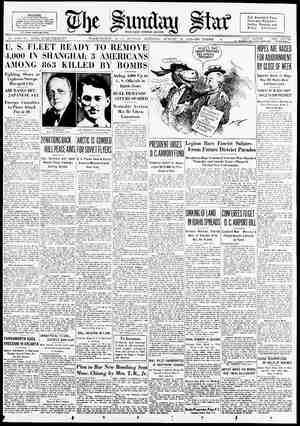Evening Star Newspaper, August 15, 1937, Page 74
You have reached the hourly page view limit. Unlock higher limit to our entire archive!
Subscribers enjoy higher page view limit, downloads, and exclusive features.
2 Pre-Views Persons in the public eye often find pleas for money in their morning mail. But how many have been asked for a whole gold mine? Probably no one but J. Frank Dobie, the author. So vividly does he spin tales of lost gold and buried treasure that people feel he must be a sort of human divining rod. One treasure hunter, claiming that he could dream the exact location of gold if he could sleep near it, offered to strike a bargain with the author — Dobie was to supoly the approximate location of lost hoards — and the dreamer would find them in his sleep. When Mr. Dobie isn’t hunting tales of buried treasure he is tracking down the legends of his native Southwest. In an early issue he tells some fascinating tales of a creature that plays a prominent role in many of these legends. Don’t miss: “CUNNING DON COYOTE” WaLLace IrwiN was bomn in Oneida, New York, a place fa- mous at the time for a colony of people with unconventional ideas about love. He hastens to add that his parents lived a half hour by motor from the colony, and there were no motors then. His father followed silver min- ing to Leadville, Colorado. Later Wallace went to Cripple Creek, and that winter the town burned to the ground. He served as one of the boy deputy sheriffs, ridinig forty-eight hours without sleep “in a pretense of keeping law and order.” His contribution was to mistake a colonel for a gunman and shoot off his cap. Even in the World War Wal- lace’s opportunities to shoot weren’t what they might have been. He was a war correspend- ent with the German, Belgian and British armies, and later a member of the Executive Com- mission for Relief in Belgium. He’s plastered all over with dec- orations by the French, Belgian, Swedish and Lithuanian govern- ments. He’ll have a humorous story in an early issue. Look for: “BEAUTIFUL LADY IN BLACK” © Padl Thompson WALLACE IRWIN THIS WEEK - — — i -y Y — - Drawing by Harry Stoner For Amelia Earhart by NATHALIA CRANE Emptied is old Lorenzo’s royal crypt; Breathless now stands the startled Taj Mahal; Amelia lies in that blue manuscript — The sea, true heroine’s memorial. So she achieves. What if the fatal prize Be misty tomb with airy marble set? Who knows where Desdemona’s kerchief lies, Or where the last word of dark Juliet? A sudden courage plucks us from ourselves, Bids us be heroine though death the price; Wherefore we bed on many lilied shelves The straight defenders of the sacrifice. Count her among the beautiful and brave, Her turquoise mausoleum in each wave. THIS WEEK FICTION A Gripping New Sericl of Medern India Hiestrated by Marshol Frantz THE TREACHEROUS ROAD, Port! TALBOT MUNDY FARST GLUIMPSE OF LOVE A Big Moment Cemes fe a Little Girl . PATTERSON DIAL Wlestrated by Leslie L. Benson STAR WITNESS An Off-the-Beaten-Treck Crime Story. . .WILLIAM A. WHITE Mivstroted by L. R. Gn'vvm ARTICLES AND FEATURES FOR AMELIA EARHART ~ ATribste . . . . - = - = - NATHALIA CRANE Drawiag by Horry Stomer THE GYPSY CRISIS Hemeless Remany Has Ne Place to Wander 5 mbymsmd,mb. YOU CANT BEAT THE IRISH — FOR FOOD Petsy Kelly Tells Why Phetogroph in Color FOR SNAPSHOOTERS Putting Theughtfel Care lnto Pictere-Taking EMIL LENGYEL GRACE TURNER GOOD TASTE TODAY ¥ YouCan't “Take It . EMILY POST STRANGER THAN MAN Are Mony Kinds of Keen-Eyed Birds CARL KULBERG WHAT OF [T? Wiy the Prone Is Full of Wrinkles R. W. DAWSON BEAUTY BREVITIES Cutting o Fine Figwe . . MARTHA LEAVITT Drowing bv Mchr Fdhn i HERE'S WHY: High intelligence Favors a Swperior Morality . IRA S. WILE, M.D. ANIMALGRAMS A Wiasome Trio Winds Up as — Hosh . GEORGE HOPF Covser Design by . B. Hazelton Magazine Section B Snatches FinanciAL note from “The Paw- ling (N.Y.) News-Chronicle” Henry Morgenthau, Jr., Secretary of the Treasury, is responsible for the handling of more money than any other living man. Recently, Thomas’s athletic field, he had the experience of being broke. He had to borrow money to pay for soft drinks for his family. O of our comforting thoughts is that everything that man can desire or imagine, someone some- where will invent or create. Mankind’s material desires are limited only by man’s imagina- tion. [ B N ONEe of our Southern editors says the most even-tempered man in America lives in his town — he is always mad. Tuere is a man in Dutchess County, N.Y., Henry B. Renner, who recently inherited the house in which he had lived for a num- ber of years. When the owner died, he willed the house to the tenant, noting in his testament that he was giving this piece of property to a perfect tenant. Mr. Renner had paid his rent every month one week before it was due. [ 2N N J Wien Lindbergh flew the At- lantic, a prize was offered for the best poem about his flight. It was won by America’s youngest recognized poet, Nathalia Crane. The poem was “The Wings of Lead.” Nathalia Crane is an intensely patriotic person. She is sensitive to the drama of great deeds. Her first poem, “The Janitor’s Boy,” written when she was nine years old, attracted attention on both sides of the Atlantic. Since then, she has published eight volumes, including two novels. She is now 24 years old and a teacher of poetry at Pratt Institute. She has just sent us the best poem we have seen as a tribute to Amelia Earhart. It appears on this page. NATHALIA CRANE Copyright, 1937, United Newspapers Magazine Corporation while playing soft ball at Lowell .
